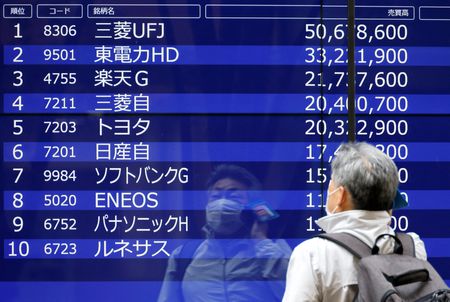By Gaurav Dogra
(Reuters) – Overseas investors bought Asian equities for the fourth consecutive month in July, spurred by signs that the Federal Reserve’s tightening cycle might be ending, a shift from last year’s policy that caused big outflows from riskier assets.
Top central banks raised interest rates again last month despite cooling inflation, but their unified shift to caution suggests the year-long global monetary tightening may be nearing its end.
Data from stock exchanges in India, Indonesia, the Philippines, South Korea, Taiwan, Thailand and Vietnam showed foreigners purchased a net $3.48 billion of equities in July, the fourth successive month of inflows since April.
Asian equities, excluding China, have become a bright spot for international investors in recent months due to their cheaper valuations after a slump in the last year, and positive growth prospects on the back of falling price pressures.
In India, foreigners remained net buyers for a fifth straight month in July, pumping $5.68 billion into the local equity markets and clocking an all-time high, thanks to strong earnings in recent quarters.
“Now India market is up 16% since April lows, FII flows base is still benign, FII ownership of India at 17.9% is still below the cycle average of 19%, so FII flows still have some room to stay positive,” said Amit Sachdeva, India Equity Strategist at HSBC.
South Korea, the Philippines and Indonesia received about $627 million, $333 million, and $181 million worth of inflows, respectively.
Meanwhile, foreigners withdrew $2.9 billion from Taiwanese equities after two monthly purchases, hit by concerns over its economic slowdown.
Thailand and Vietnam also recorded some meagre outflows last month.
Foreign interest in China has deteriorated in the second quarter of this year, hit by concerns over a faltering post-COVID economic rebound, disappointment over the absence of robust policy response and renewed Sino-U.S. tensions.
In the second quarter, Chinese equities faced outflows worth $4.25 billion in the second quarter of this year, while Asia ex-China equities bagged inflows worth $18.35 billion.
Some analysts say this divergence could continue.
“While China was a favourite of foreign investors in 1Q23, preference began to decline in the second quarter as macroeconomic data progressively disappointed and high youth unemployment levels and a slowdown in the property sector cast a shadow on domestic consumption outlook,” said Manishi Raychaudhuri, Asian equity strategist at BNP Paribas.
(Reporting by Gaurav Dogra and Patturaja Murugaboopathy in Bengaluru; Editing by Varun H K)

